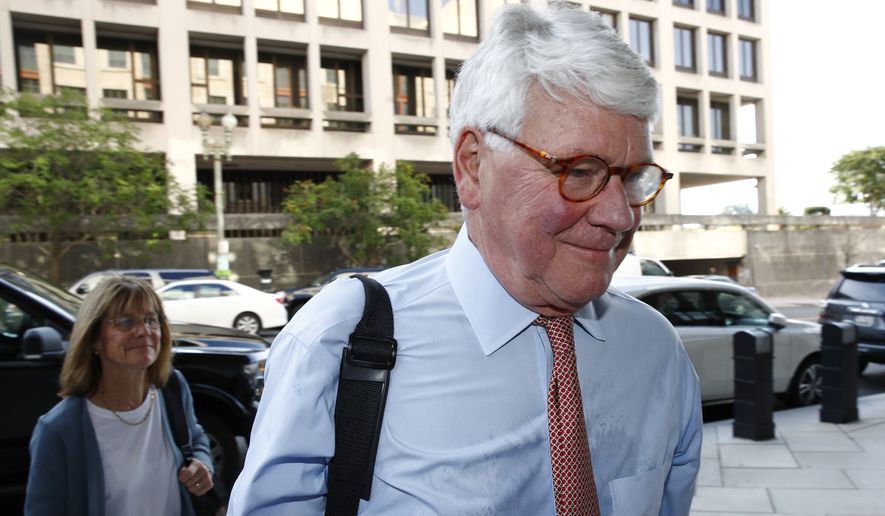The Justice Department’s efforts to crack down on questionable foreign lobbying practices suffered another major setback this week when a jury in Washington acquitted a onetime top Obama White House attorney.
That followed a case in July in which prosecutors won a conviction against a former lobbying partner of Michael Flynn, the disgraced former Trump national security adviser, but a federal judge said he is considering tossing the conviction because he is not sure prosecutors proved their case.
The verdict was a letdown for prosecutors, who pushed for stricter enforcement of the Foreign Agents Registration Act after the 2016 elections as a means to encourage more transparency from Americans who promote foreign interests in the U.S.
The law became a weapon of choice for Robert Mueller, who used it during his special counsel investigation into Russian election meddling and snared Flynn and two other Trump campaign figures, Paul Manafort and Rick Gates. All three eventually pleaded guilty to federal charges.
But the recent setbacks suggest there is a limit to the law’s usefulness for federal prosecutors.
The former Obama attorney, Greg Craig, was acquitted of lying to the Justice Department’s FARA unit. Weeks earlier, the judge in his case tossed out a charge of failing to register under the Foreign Agents Registration Act for his work on behalf of the Ukrainian government.
Judge Amy Berman Jackson concluded that a 2013 letter Mr. Craig sent to FARA investigators was sufficient to clear him of charges under a law barring false FARA submissions.
“I think these cases have weakened the credibility of the FARA unit,” said Claire Finkelstein, a University of Pennsylvania law professor who researches national security law. “Even if Greg Craig had been convicted on the lying charge, it still would have been a black eye for the FARA unit because the foreign lobbying charge was dismissed.”
Ben Freeman, director of the Foreign Influence Transparency Initiative at the Center for International Policy, said the Justice Department needed a win in the Craig case.
With so many Republicans brought up on FARA charges, he said, the optics of taking down Mr. Craig, a Democrat, would have benefited the department.
“The Justice Department really needed someone on the other side of the aisle to say, ’We are being evenhanded.’ So not getting him does hurt them,” he said.
The Foreign Agents Registration Act was enacted just before World War II. It does not bar Americans from working with foreign governments, but it does require that they be transparent about their activities.
What sorts of activities require registration can be tough to suss out, and the law languished in obscurity for years.
From 1966 to 2017, the Justice Department brought just seven prosecutions under the act.
Under the Trump administration, the Justice Department revamped the FARA unit and said it would aggressively pursue cases.
David Laufman, a partner at Wiggin and Dana who oversaw FARA enforcement while chief of the Justice Department’s counterintelligence and export control section, said the goal is to increase registration among foreign lobbyists.
“The Justice Department’s more aggressive enforcement of FARA includes a great deal more than the number of criminal prosecutions brought and the success of those prosecutions,” he said. “It focuses predominately on affecting compliance by ensuring parties that need to register do, in fact, register. So it’s a mistake to measure the success of the Justice Department’s overall increase of FARA enforcement by the success or failure of individual criminal prosecutions.”
Even so, it does not appear registrations have increased since the Justice Department ramped up FARA enforcement. At the end of last year, 453 registrations were active, according to the Justice Department’s FARA database. As of Thursday, the department had 458 active registrants.
The Justice Department did not return a request for comment.
Hampering the department’s effort is the unit’s limited administrative authority. Investigators don’t have the power to issue civil investigative demands, or CIDs, which legally compel investigation subjects to provide information and documents. Investigators can ask for information from foreign agents but can’t force subjects to comply with the law outside of bringing criminal charges. That puts lobbyists on the honor system to self-report.
Other Justice Department sections, including the antitrust and environmental and natural resources divisions, do posses CID authority.
As a result of the unit’s limited enforcement power, lobbyists have largely flouted FARA requirements, and registrations have consistently dwindled from a peak of 2,079 in 1991.
The lack of administrative power was evident in the Craig case. In 2013, when Mr. Craig met with department investigators, they were essentially forced to take his word that he didn’t have to register for his work on a project connected to the Ukrainian government.
All they asked of Mr. Craig was that he put his reasons for not registering in a letter.
“The Justice Department doesn’t have a lot of options to enforce FARA,” Mr. Freeman said. “There are no real civil penalties, they can’t issue fines. It’s like if you get pulled over for speeding and the police ask you to write a letter saying you weren’t speeding. It doesn’t work that way for speeding tickets, but it works for foreign influence violations.”
Another problem is that the FARA statute is vague. Had the statute contained more certainty, it would be clear whether the Justice Department was justified in bringing charges against Mr. Craig in the first place. When Judge Jackson dismissed the foreign lobbying charge against Mr. Craig, she said the statute was too ambiguous to justify the criminal count.
“No one is really clear who is under the statute,” Ms. Finkelstein said. “Craig worked for a firm that is working for the Ukraine. He is two steps removed, and the statute doesn’t guide us on that. That’s why the judge threw out the FARA violation.”
• Jeff Mordock can be reached at jmordock@washingtontimes.com.




Please read our comment policy before commenting.